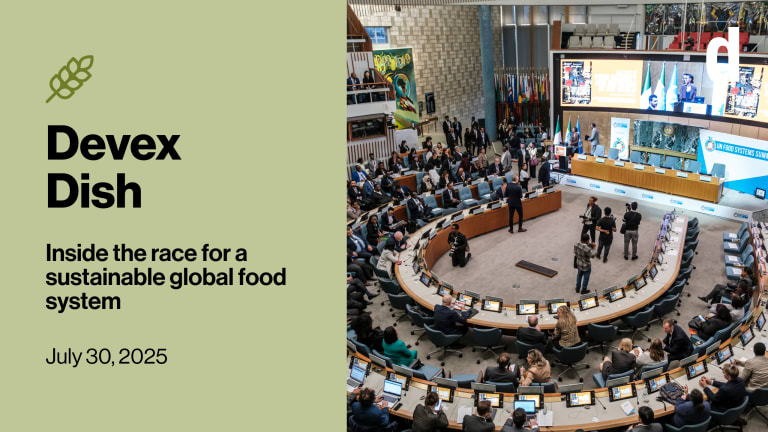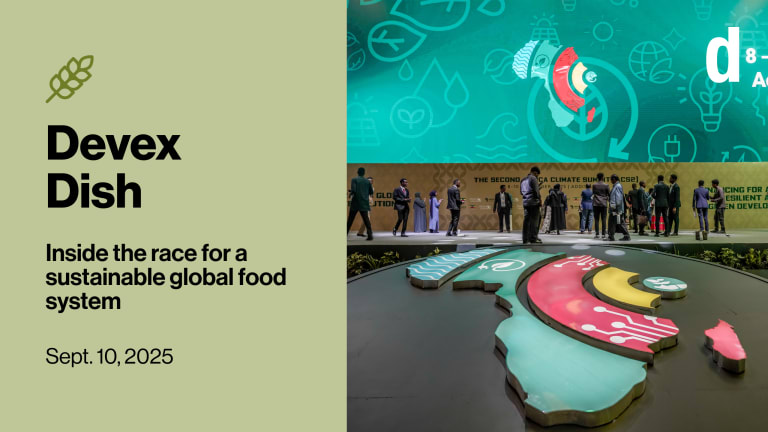Inside the UN hub carrying on the Food Systems Summit agenda
The hub isn't perfect, it's head says, but is figuring out how to best support countries in transforming food systems.
Last year’s United Nations Food Systems Summit, or UNFSS, held on the sidelines of the General Assembly, was billed as a game changer for the way the world grows, harvests, and transports food. The U.N. promised it would not just bring different sectors together for a one-time gathering, but would form relationships and a standing infrastructure to continue the work beyond the sometimes contentious two-day meeting in New York all the way until 2030. That promise has taken the form of a U.N. Food Systems Coordination Hub led by Stefanos Fotiou, who believes that as important as deciding what the hub should do is deciding what it should not do. “The hub is not there to substitute the individual agencies and to do the technical work on food systems,” Fotiou, who also serves as director at the Office of Sustainable Development Goals in FAO, told Devex in an interview. He emphasized the hub’s role is one of coordination. “We exist in order to support countries to implement their pathways by coordinating the assets of the U.N. system and the greater ecosystem of support,” Fotiou said, referring to the “national pathways,” or plans, that the UNFSS helped countries develop to outline their food systems transformation agendas. “The hub is not going to become a funding agency itself because this is not our role.” --— Stefanos Fotiou, director, United Nations Food Systems Coordination Hub The hub’s strategic plan came from internal consultations with relevant U.N. agencies such as the Food and Agriculture Organization, World Food Programme, International Fund for Agricultural Development, U.N. Environment Programme, World Health Organization, and the U.N. Development Coordination Office. It also included a survey distributed to countries to understand what support they needed from the hub and how exactly it should be provided. “Our main effort is to really look at the pathways and support the national food system focal points to make them happen. This is what we have started to do, and we already have a couple of countries that we provide direct support.” The hub was “up and running” by late April after its work plan was approved by the oversight group, Fotiou said. That group is composed of the heads of the agencies that support the hub. Future support will also be provided by a science and innovation advisory group, and a “Stakeholder Engagement and Networking Advisory Group.” The country survey revealed two main findings about what was most needed out of the hub, Fotiou said. “One of the things they asked: Give us guidance on how to raise money,” he said. “The hub is not going to become a funding agency itself because this is not our role. But they’re asking [for] support so they can leverage different ways of financing. We know that when it comes to financing food systems transformations, you need to bring together a portfolio that will include public, private, global, and domestic finance.” The hub is trying to convince existing funds and financial institutions, such as the World Bank and Green Climate Fund, to establish food system support windows, he said. The second thing countries want, according to the survey, is support with monitoring and evaluation of commitments to transform food systems. The U.N. has called for the first post-UNFSS “stocktaking” to be held in 2023, and Fotiou said there is a recognition that production volume alone can no longer be the only metric of agricultural success. Production must be done in a way that benefits people, planet, and economy, he said. The hub will continue the “food system dialogues” that were a part of the lead-up to last year’s summit — largely online convenings due to the pandemic — which gathered diverse people from around the food system to discuss reforms. It will connect people working on food systems transformation, including not only relevant U.N. agencies, but nonprofits, the private sector, and foundations. The hub will also be responsible for bringing concerns of the countries back to the U.N. system, Fotiou said. So far, there have been different levels of engagement between the hub and the countries it serves, Fotiou said. Sometimes, large delegations from multiple government ministries show up to meetings, he said, while other nations send just one person. The main points of contact between the hub and countries remain the “food system national conveners,” who the secretary general appointed before the UNFSS to manage each nation’s role at the summit. The majority of those people come from the ministry of agriculture, according to Fotiou, while others are from ministries of development, environment, and health. When the hub interacts with countries, it includes the food system national convener, the U.N. resident coordinator, and the U.N. focal point for food systems. “We ask them to bring in these meetings as many people as they want,” Fotiou said, while acknowledging the process has not been totally seamless. “We were building the plane and at the same time we were flying the plane, and we had some bumping,” he said. Because the UNFSS and its coordination hub are part of the U.N. effort to meet the Sustainable Development Goals, its efforts are set to continue to 2030. “From when we started until the stocktaking moment next year, we are piloting this approach: This is the way we want to work with the countries, this is how we do it. We expect from the countries and the stakeholders to come back to us next year and say ‘Okay, you can improve there, you can change that, you should continue doing this,’” Fotiou said. “We are here not because we are a new agency but because we want to coordinate — because everyone in the U.N. system is indispensable for food systems.”
Last year’s United Nations Food Systems Summit, or UNFSS, held on the sidelines of the General Assembly, was billed as a game changer for the way the world grows, harvests, and transports food.
The U.N. promised it would not just bring different sectors together for a one-time gathering, but would form relationships and a standing infrastructure to continue the work beyond the sometimes contentious two-day meeting in New York all the way until 2030.
That promise has taken the form of a U.N. Food Systems Coordination Hub led by Stefanos Fotiou, who believes that as important as deciding what the hub should do is deciding what it should not do.
This story is forDevex Promembers
Unlock this story now with a 15-day free trial of Devex Pro.
With a Devex Pro subscription you'll get access to deeper analysis and exclusive insights from our reporters and analysts.
Start my free trialRequest a group subscription Printing articles to share with others is a breach of our terms and conditions and copyright policy. Please use the sharing options on the left side of the article. Devex Pro members may share up to 10 articles per month using the Pro share tool ( ).
Teresa Welsh is a Senior Reporter at Devex. She has reported from more than 10 countries and is currently based in Washington, D.C. Her coverage focuses on Latin America; U.S. foreign assistance policy; fragile states; food systems and nutrition; and refugees and migration. Prior to joining Devex, Teresa worked at McClatchy's Washington Bureau and covered foreign affairs for U.S. News and World Report. She was a reporter in Colombia, where she previously lived teaching English. Teresa earned bachelor of arts degrees in journalism and Latin American studies from the University of Wisconsin.








